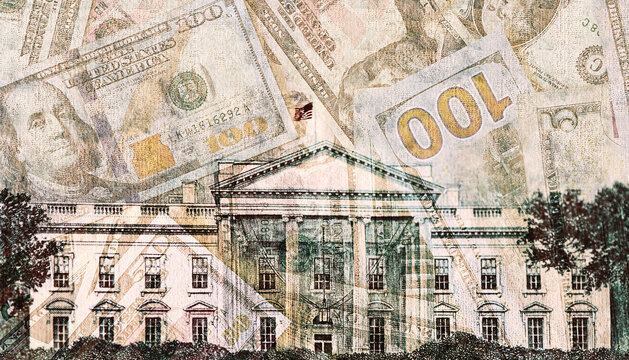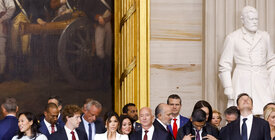
Codifying the Constitution’s Emoluments Clauses
To prevent corruption, the Constitution prohibits the president and other officials from receiving untoward benefits. Congress, however, must take action to enable enforcement.

Part of
A number of President Donald Trump’s actions in his second term potentially violate the Constitution’s Foreign and Domestic Emoluments Clauses. These clauses bar the president and other federal officials from receiving emoluments — meaning benefits or advantages — from foreign governments and, in the case of the president, the federal and state governments. They are among the United States’ oldest explicit anticorruption safeguards and the only ones written directly into the Constitution.
Before Trump’s first term, these provisions rarely received significant public attention. But that changed when Trump took office in 2017 and declined to meaningfully divest from his extensive business holdings, including hotels and other properties around the world that received patronage and other sizable benefits from foreign governments and U.S. state officials. The apparent violations of the Emoluments Clauses prompted several lawsuits against the president, all of which foundered on procedural grounds and were later dismissed after he left office. The failure of these legal actions reinforces the need for legislation and other congressional actions to clearly articulate which benefits are prohibited and who can enforce against violations. Now, in Trump’s second term, the need for congressional action has never been clearer.
The president’s business entanglements have considerably expanded since his first term, including his burgeoning cryptocurrency empire and a host of new real estate deals in the Middle East and other parts of the world. More than any of his recent predecessors, he has also adopted an explicitly transactional approach to governing, one that melds his political identity as the U.S. president with his personal business interests. 1 This is possible in large part because presidents are exempt from many federal laws against corruption. 2
Rectifying this situation requires congressional action to fully implement the Constitution’s Foreign and Domestic Emoluments Clauses and ensure guardrails at the top of government. This paper outlines what Congress can do, starting with more robustly exercising its oversight powers and using formal disapproval resolutions for specific emoluments that lack congressional consent. New legislation is also imperative. It must, among other things, provide a clear statutory definition of the term emoluments that broadly covers any benefit or advantage that has the potential to influence a federal official or employee. This legislation should also expressly prohibit indirect emoluments, create limited exceptions for specific assets that pose little threat of undue influence or conflicts of interest, and establish an effective enforcement scheme.
These recommendations are certainly not the only needed legislative response to the president’s business entanglements and the broader erosion of anticorruption safeguards. But given Congress’s unquestioned authority to police emoluments violations, they are essential steps that lawmakers can take to bolster government integrity. 3 Reining in corruption has broad appeal among voters across the political spectrum, making this area ripe for bipartisan compromise. 4
Part I of this paper reviews the framers’ motivations for including the Emoluments Clauses in the Constitution, as well as how courts and lawmakers have interpreted and enforced the provisions in the past. Part II identifies the apparent emoluments violations that have occurred so far during Trump’s second term. Part III discusses why Congress is best positioned to address this problem and lays out specific recommendations and the key policy considerations that inform them.
Notas al Pie
-
1
See Eric Petry, “Uncovering Conflicts of Interest and Self-Dealing in the Executive Branch,” Brennan Center for Justice, February 21, 2025, https://www.brennancenter.org/our-work/research-reports/uncovering-conflicts-interest-and-self-dealing-executive-branch.
-
2
Daniel I. Weiner, Strengthening Presidential Ethics Law, Brennan Center for Justice, December 13, 2017, https://www.brennancenter.org/sites/default/files/publications/Strengthening%20Presidential%20Ethics%20Law.%20Daniel%20Weiner.pdf. The Supreme Court has exacerbated this lack of guardrails against presidential misconduct, including through its 2024 decision granting presidents broad immunity from prosecution for any conduct that arguably falls within the scope of their official duties. See Trump v. United States, 603 U.S. 593 (2024).
-
3
See, e.g., Preet Bharara et al., Proposals for Reform: National Task Force on Rule of Law and Democracy, Brennan Center for Justice, October 2, 2018, https://www.brennancenter.org/our-work/policy-solutions/proposals-reform-national-task-force-rule-law-democracy; and Weiner, Strengthening Presidential Ethics Law.
-
4
See Taylor Orth, “Most Americans See Corruption Among Politicians, Judges, and Executives as Serious Problems,” YouGov, January 17, 2025, https://today.yougov.com/politics/articles/51398-most-americans-see-corruption-as-serious-problem.
Más sobre la Corrupción en Estados Unidos collection
-
¿Qué son las Cláusulas de Emolumentos?
Los fundadores de la Constitución querían aislar al presidente y al gobierno federal de influencias corruptivas, pero se necesita una ley nueva para garantizar su correcta aplicación. -
¿Quiénes se benefician de la iniciativa de Trump de cerrar la Oficina para la Protección Financiera del Consumidor?
La decisión de cerrar la Oficina para la Protección Financiera del Consumidor parece ser otro ejemplo que demuestra que la clase donante está dominando Washington. -
Los conflictos de interés y las actuaciones en beneficio propio de la administración Trump
La rama ejecutiva del gobierno podría usar los contratos federales, aranceles, regulaciones, impuestos y otros mecanismos del gobierno para beneficiar a los donantes de campaña, oficiales de alto nivel y al propio presidente.







